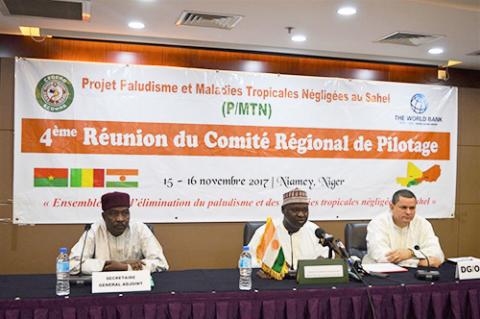
Date: 2017-11-16 07:21:23 ID: 1756
Niamey, 15 November 2017 – The Minister of health of the Republic of Niger, Dr Idi Iliassou MAINASSARA, this Thursday 15 November 2017, chaired the official opening session of the Regional Steering Committee (RSC) of the Malaria and Neglected Tropical Diseases (M/NTD) in the Sahel project, which witnessed the participation of the Director General of the West Africa Health Organisation (WAHO), Dr Xavier CRESPIN.
Present were delegations from the three project beneficiary countries, Burkina Faso, Mali and Niger, as well as the World Bank, CAMEG, members of staff of WAHO and of the M/NTD project.
The RSC meeting, which is the fourth of its kind, aims at: (1) evaluating the level of implementation of recommendations from the 3rd meeting of the Regional Steering Committee held in Bamako on 24 and 25 July 2017; (2) assessing the level of implementation of the 2017 Annual Work Plans (AWP) and the Procurement Plans (PP); (3) Validating the 2018 Annual Work Plans and the Procurement Plans of countries, WAHO and the WHO; (4) Validating the WHO 2018 Annual Plan of technical assistance to countries; (5) Presenting and discussing the need for medicines for the CPS 2018 period per country; and (6) Presenting and assessing the level of implementation of recommendations from the joint WAHO-World Bank project of April-Mai 2017.
In his opening speech, the Minister of health of the Republic of Niger, Dr Idi Iliassou MAINASSARA, underscored the greatest importance ECOWAS Heads of States attach to the control of Malaria and Neglected Tropical Diseases. In Niger, the control constitutes ‘‘one of the major concerns of the authorities of the highest level, with the President of the Republic at the forefront’’.
He indicated that the meeting was within the context of the coordination mechanisms adopted for the implementation of the project.
The Minister requested members of the committee to formulate clear and relevant recommendations, which would foster the advancement of the implementation of activities in order to attain the objectives of the project. Before declaring the RSC meeting officially opened, he thanked the World Bank, WAHO and all the project technical partners for their constant support to countries towards the improvement of the health status of the people.
Earlier on, the Director General of WAHO, Dr Xavier CRESPIN, in his welcome address recalled the genesis of the project, the challenges faced at the beginning and some of the major achievements, particularly: (1) the organisation of annual joint planning meetings, cross-border meetings, chemo-prevention of seasonal malaria campaigns and mass treatment of NTD in the three countries with a very satisfactory coverage of the target population; the definition of priority research themes; meetings to review and share experiences on mass treatment campaigns; (2) strengthening of communication in the area of malaria and NTD; and (3) harmonisation of the process to motivate and retain Community Health Workers; as well as (4) organizing surgery camps for the management of complications from NTD.
The DG/WAHO thereafter underscored the importance of the two-day meeting, which involved discussions on the major interventions of the project; an overview of progress made; sharing of lessons learned; and defining strategic priorities for the remaining period.
He reiterated the availability and commitment of WAHO to support the efforts of countries to achieve the objectives of the M/NTD project and the implementation of all other health interventions.
Furthermore, the DG/WAHO expressed his gratitude to the World Bank for funding the project and to the other partners for their technical support.
Concluding, he warmly thanked the Minister of health of the Republic Niger for his support to WAHO activities.
It is worth noting that the Regional Steering Committee of the Malaria and Neglected Tropical Diseases in the Sahel project, chaired by the Director General of WAHO, was constituted to assess the progress made in the implementation of the project, to provide direction and make recommendations to optimise the implementation of the project activities.
